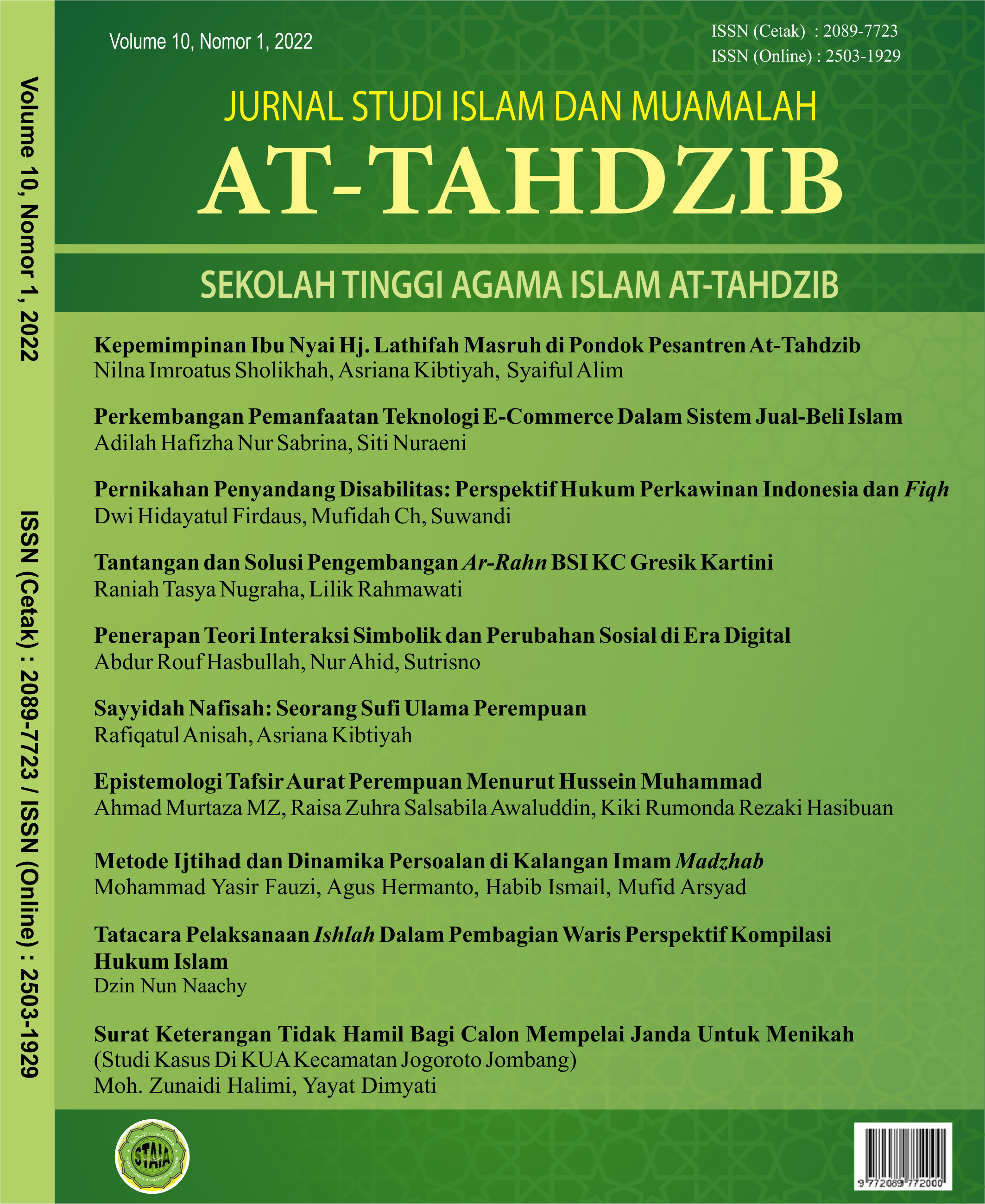Surat Keterangan Tidak Hamil Bagi Calon Mempelai Janda Untuk Menikah
Studi Kasus Di KUA Kecamatan Jogoroto Jombang
Abstract
Background. The Office of Religious Affairs is the foremost agency of the Ministry of Religion in carrying out the duties of Islamic religious affairs in district level. As a community guidance and service institution, of course, the KUA plays a major role in the creation of a social order under its auspices, both in the field of religion or marriage. So things that can show benefit or benefit must be pursued.
Aim. (1) To describe the marriage procedure at KUA Jogoroto Jombang Subdistrict, and (2) Urituk to find out in depth the review of maslahah on additional requirements for marriage at KUA Tembelang District, Jombang.
Methods. To answer these two questions, the approach used in writing this thesis is descriptive qualitative, namely research methods that aim to accurately describe the characteristics of an individual, situation, symptom or particular group. This qualitative descriptive method researchers use to systematically describe how the procedures used by KUA Jogoroto sub-district in organizing marriages will then be analyzed with Islamic law.
Results. Analysis of the data obtained from the research findings can be revealed that: (1) As with the marriage procedure in KUA in general, KUA Jogoroto also applies the same rules based on the applicable law. The only difference is that there are special rules for prospective brides who are already widows, which must attach a pregnancy-free certificate from the sub-district health center as a mandatory requirement for marriage at the KUA Jogoroto District (2) The policy of the Head of the Jogoroto District KUA is to apply special rules for widows who are getting married at KUA Jogoroto District with the aim of preventing violations of the iddah period / waiting time and reducing the number of marriages of pregnant women as well as providing an understanding to the Jogoroto community about the iddah period does not conflict with Islamic law and is a policy that has benefit values ​​and can be established as a rule.
References
Abdul Rahman Ghozali. (2010). Fiqh Munakahat. Jakarta: Kencana.
Abdurrahman. (1995). Kompilasi Hukum Islam di Indonesia. Jakarta: CV Akademika Pressindo.
Abdurrahmat Fathoni. (2006). Metodologi Penelitian dan Tehnik Penyusunan Skrips. Jakarta: PT. Rineka Cipta.
Anselm Strauss dan Juliet Carbin. (2003). Dasar-Dasar Penelitian Kualitatif: Tata Langkah dan Tehnik-Tehnik Teoritis Data, terj. Muhammad Shodiq dan Imam Muttaqien. Yogyakarta: Pustaka Pelajar.
Djam’an Satori dan Aan Komariah, Riduwan, (ed.). (2009). Metodologi Penelitian Kualitatif. Bandung: Alfabeta.
H.S.A. al-Hamdani. (2002). Risalah Nikah. Jakarta: Pustaka Amani.
Kemendikbud. (1994) Kamus Besar Bahasa Indonesia. Jakarta: Balai Pustaka.
Kementerian Agama RI. (2008). Al-Quran dan Terjemahnya. Bandung: CV Diponegoro.
M. Quraish Shihab. (2013) Al-Quran dan Maknanya. Tangerang: Lentera Hati.
Mukhtar Yahya dan Fatchur Rahman. (1986). Dasar-Dasar Pembinaan Hukum Fiqih Islami. Bandung: PT. Al-Ma’arif.
Slamet Abidin dan Aminuddin. (1999). Fiqih Munakahat. Bandung: Pustaka Setia.
Subana. (2005). Dasar-Dasar Penelitian Ilmiah. Bandung: Pustaka Setia.
Sumadi Suryabrata. (1998). Metodologi Penelitian. Jakarta: Raja Grafindo.
Wahbah al-Zuhaili. (1989). al-Fiqh al-Islam wa Adillatuh. Beirut: Dar al-Fikr.

Jurnal Studi Islam by At-Tahdzib is licensed under a Creative Commons Attribution 4.0 International License.
Based on a work at http://ejournal.kopertais4.or.id/mataraman/index.php/tahdzib





